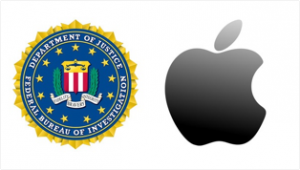Last week the Federal Bureau of Investigation (FBI) (i.e. the government) received a court order (i.e. from the government) that would force private computer giant Apple to write a program (a “backdoor”) to break the privacy-protecting encryption of their iPhone.  The court order stems from the FBI’s investigation into the awful murder by two Islamists of fourteen people in San Bernardino, California. Investigators recovered the locked iPhone of one of the gunmen – and they want in. No one more than me wants to figure out as much as possible about and from these horrible people. But that doesn’t mean I want the government to have a perma-backdoor to every iPhone ever. Unfortunately, the Feds are using this heinousness as an emotional ploy to get that skeleton key – manufactured for them by Apple at metaphorical gunpoint. Yet again reviving the Big Government maxim – never let a crisis go to waste. FBI Director James Comey asserts this is about “the victims and justice.” But is demanding Apple do an injustice to and make victims of millions of iPhone owners. Who bought the product in part because of the protections it provides. 18th Century British jurist and politician William Blackstone said “It is better that ten guilty escape than one innocent suffer.” Subjecting millions to surreptitious government snooping – to learn more about two heinous people who are already dead and thus beyond prosecution – turns Blackstone’s maxim on its head. And then blows it up. Never mind that government its own self (the San Bernardino County Department of Public Health, who owned the shooter’s phone) screwed up the possibility of recovering the data. Apple should not be forced to screw their customers – and their good name – to bail out government. Government’s anger with the authoritarian-prevention encryption provides WAY predates this one phone.
Apple and Others Encrypt Phones, Fueling Government Standoff: “The new encryption will make it much harder for the police, even with a court order, to look into a phone for messages, photos, appointments or contact lists, they say. Even Apple itself, if served with a court order, won’t have the key to decipher information encrypted on its iPhones.” And here we are. But encryption is a tool – like guns and shovels are tools. It can be used for good or ill. And can be used to protect the good from the ill. And as with guns and shovels, encryption is used for good WAY more often than it is used for ill. We should not allow the government access to millions of phones – encrypted to protect millions of good people – to get at one bad person’s data. The damage would be omni-directional – and cataclysmic. Issue Brief: A “Backdoor” to Encryption for Government Surveillance: “Encrypting smartphones and other tech products will help protect against malicious hacking, identity theft, phone theft, and other crimes. However, a government mandate requiring companies to build a “backdoor” through encryption to facilitate surveillance would put consumers at grave risk and impose heavy costs on US businesses.” So we have the government continuing its endless campaign to gain backdoor access to every smart phone on the planet. And you have private sector Apple standing up – against the Leviathan, and for We the Consumers. Who do you trust more going forward? Private companies looking out for us – or government looking in on us? It isn’t a tough call. | ||||
| Seton Motley is the founder and president of Less Government. Please feel free to follow him on Twitter (@SetonMotley) and Facebook. It’s his kind of stalking. | ||||

